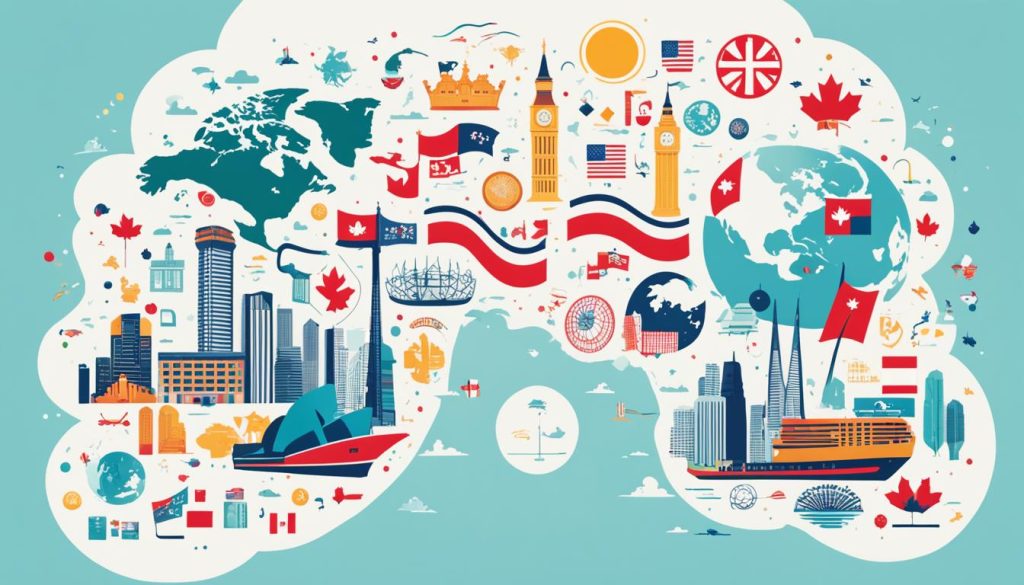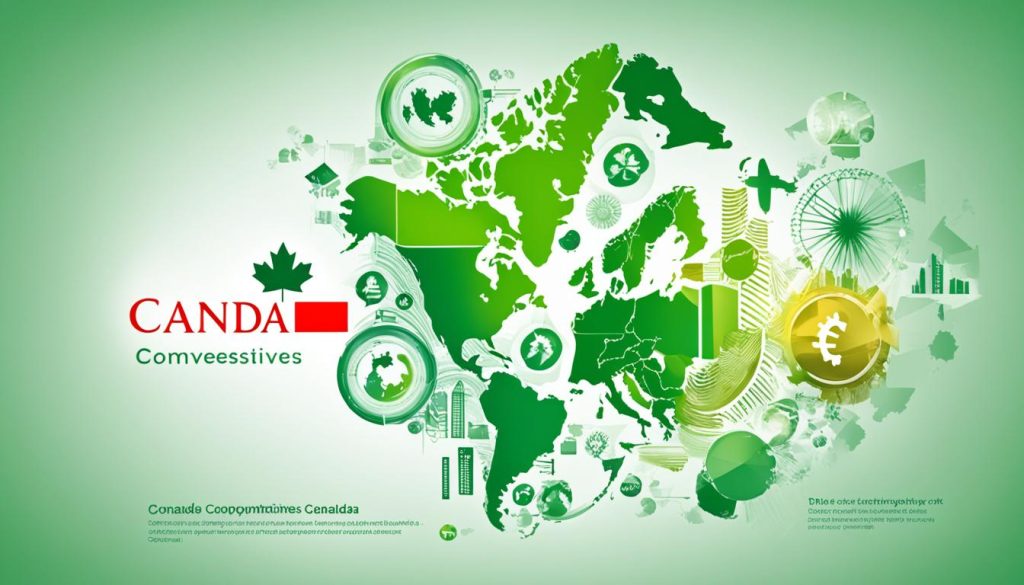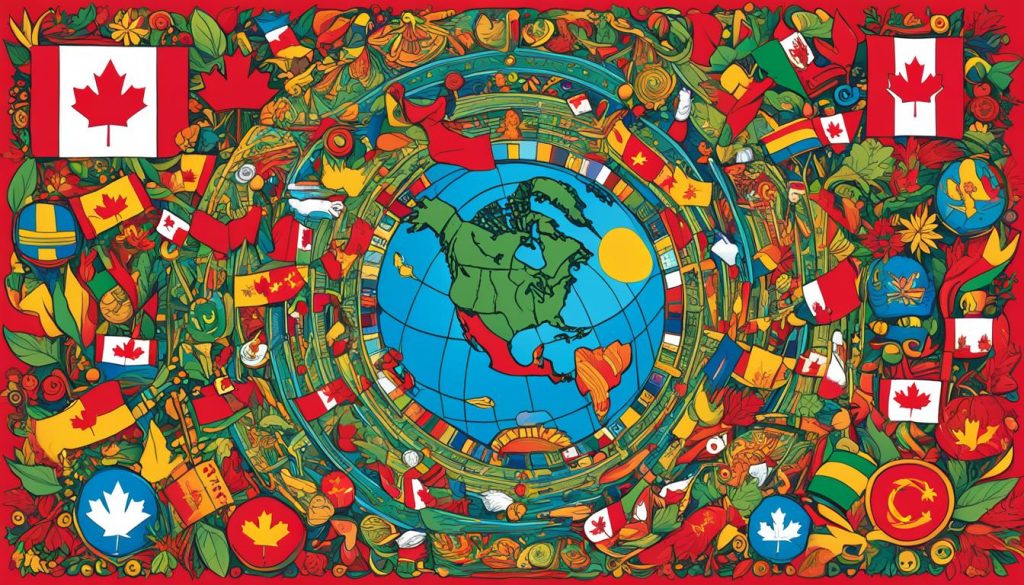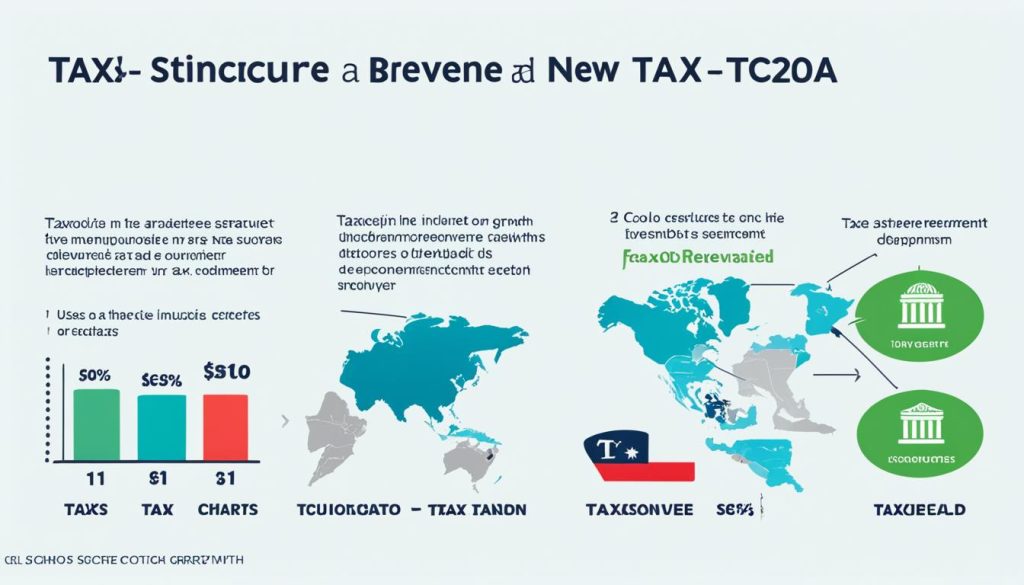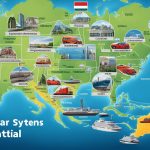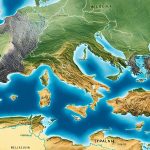We’re exploring the business worlds of vibrant Singapore, sturdy Canada, and lively New Zealand. This journey gives us a peek into how global markets and corporate behaviors differ. It shows how each country uses its own methods to support business growth, within their own set of rules and cultural ways.
We’ll look at how Singapore thrives on new ideas, Canada’s market is known for being clear and honest, and New Zealand’s business scene welcomes global trade. For anyone looking to work in these unique settings, understanding their business styles is crucial.
This comparison sheds light on the differences and similarities in their business manners and cultural values. It aims to provide essential tips for making it in the global business world.
Introduction to Business Landscapes in Singapore, Canada, and New Zealand
Today’s global business scene is complex. It demands an understanding of different economic settings and their benefits for international business. As trade and technology draw the world closer, focusing on the unique business traits of Singapore, Canada, and New Zealand is vital. These countries show varied yet matching aspects that influence global trade and business actions today and tomorrow.
Singapore shines as an example of a place that loves business. People praise it for rules that are friendly to businesses, its key location, and its push for new ideas. It stands out in global business talks, known for being a leader in making business easy.
Canada is known for its honest dealings and stable economy. This reputation helps Canadian companies compete globally while enjoying a high standard of living. This attracts business people looking for good chances in advanced economies.
Heading east, New Zealand beckons with its strong trade policies and simple rules. It draws entrepreneurs with its broad trade deals and easy-going approach to business law. It’s a favourite for those wanting to explore a free and open market.
This mix makes Singapore, Canada, and New Zealand key examples of economic diversity. Exploring their business landscapes shows how they help international business grow. They reveal the push and pull behind thriving economic scenes.
- Singapore is forward-thinking in making business smooth and having top-notch facilities.
- Canada’s strength is in balancing economy, society, and culture.
- New Zealand uses its location and trade links to shine on the global stage.
Looking at how business flows in these places, we see both opportunities and hurdles. Being flexible and planning well are key in international business. Learning from how each country shapes its business space offers great insights for navigating global markets.
Overview of Singapore’s Business Environment
Singapore’s business landscape shines as a hub for starting up, attracting entrepreneurs from around the world. Its excellent location, strong trade agreements, and dedication to protecting investors shape its economy. This makes it a standout choice for business.
Ease of Doing Business Ranking
Singapore shines in global trade, ranked 2nd for ease of doing business by the World Bank. This rank reflects the country’s effective regulations and forward-thinking economic policies. It shows how business-friendly Singapore is.
Starting A Business in Singapore
Starting a business in Singapore is easier than you might think. The country ranks 4th worldwide for the ease of starting a business. This is thanks to a seamless process covering registration and legal actions, all streamlined for efficiency.
Protecting Minority Investors in Singapore
- Corporate Governance: Singapore’s corporate governance framework is robust, ensuring transparency and fair treatment for all shareholders.
- Legal Recourse: The legal foundation provides minority investors with adequate means to challenge and protect their interests.
- Regulatory Bodies: Various regulatory entities are vigilant in upholding the rights of investors, mirroring Singapore’s high ranking in investor protection.
Looking after minority investors is a key part of Singapore’s financial rules. Strong actions are taken to maintain Singapore’s good name and its 3rd place in protecting minority investors globally. This is why Singapore is trusted internationally.
Understanding Canada’s Business Climate
The world’s economies are always changing. This makes it vital to understand different countries’ business climates. Canada’s economic strategy is fascinating because it mixes forward-looking policies with strong safeguards. These factors greatly improve its position for business activities and attracting investments.
Global Competitiveness of Canada
Canada stands out in the global economy, ranked 23rd. This rank reflects its great infrastructure, market efficiency, and innovative enterprises. All these support its continuous economic progress.
Corporate Taxation in Canada
Canada’s economy benefits from its tax policies. Its taxation system combines progressive rates with firm enforcement. This means both companies and people pay their fair share. Personal tax returns start at C$49,020. This system looks after the government’s and taxpayers’ needs well.
Intellectual Property Rights Protection
Canada is a leader in protecting IP rights, ranked 2nd worldwide. This shows its dedication to an environment where innovation thrives. It ensures new inventions and business concepts are well protected.
Business Operations in New Zealand
New Zealand offers a great setting for businesses to thrive. Its global market ties, simple government processes, and competitive workers attract international interest. These features place it as a top spot for business and trade ventures.
Openness to Trade in New Zealand
The country is well-known for its trade policies, aiming for an open economy. With fewer people and vast agricultural areas, it focuses on growing through exports.
New Zealand’s Approach to Bureaucracy
Dealing with bureaucracy in New Zealand is easy and clear. Its streamlined and open regulations help companies understand how to operate smoothly there.
Labor Market Competitiveness
New Zealand boosts its labour market by offering training and being flexible. This approach, along with a focus on digital skills and good working relationships, benefits various industries. It creates a strong workforce in a country with fewer people.
Compare Business and Culture Between Singapore, Canada, and New Zealand
Looking at how business customs, corporate cultural diversity, and international entrepreneurship work together, we learn a lot. It helps us see how culture shapes the way business is done. By comparing Singapore, Canada, and New Zealand, we find out they blend their customs and cultures in unique ways.
- In Singapore, East meets West in business ways. This mix, along with cultural diversity, helps in dealings across cultures. It’s great for businesses that work globally.
- Canada’s belief in many cultures shapes its business world. This openness brings new ideas. It makes the country welcoming for businesses and entrepreneurs from everywhere.
- New Zealand values its beautiful nature and a balanced life. This belief is seen in its business practices. They focus on sustainable ways and businesses that care for the environment.
This broad look at how business and culture mix in these countries shows why cultural diversity is key. It drives the entrepreneurial spirit and helps businesses think globally. Looking at these differences teaches us a lot about working across cultures and growing globally.
A country’s cultural strengths play a big role in the global market. Smart business leaders understand this. They use cultural insights to grow their companies and to add to the global business conversation.
Cultural Diversity and Its Impact on Business in Singapore
Singapore is known worldwide for its Singapore multicultural society. Its diverse cultural scene shapes its business world. The emphasis on different cultures within its communities creates opportunities for innovation and teamwork. This diversity is not just a trait but a strategic advantage that boosts the economy and influences business diversity impact.
Companies in Singapore use ethnic diversity to find more ideas and views. This mix of cultures enhances creativity, which helps the economy grow and be competitive. The merging of different customs, languages, and traditions makes Singapore’s market very dynamic and successful.
- Incorporating diverse cultural insights into product development and marketing strategies
- Designing inclusive workplace policies that attract top talent from a variety of backgrounds
- Facilitating cross-cultural negotiations and partnerships that expand business opportunities
The lively Singapore multicultural society shapes how entrepreneurs and business leaders work. They are pushed to include everyone and develop skills to work across cultures. Thus, respecting ethnic diversity is essential for business success as well as being socially important.
- Understanding local customs and consumption habits influenced by diverse ethnicities
- Engaging with multiple community stakeholders to foster greater business integration
- Implementing corporate social responsibility initiatives that reflect the multicultural fabric of society
Singapore’s way of blending different cultures is about harmony and working together. This environment allows businesses to grow, showing that business diversity impact brings big advantages when managed well.
Canada’s Cultural Mosaic and Economic Interactions
Canada’s cultural diversity is vital to its economy and how people work together. The country is known for its peaceful working relationships. This helps in bringing economic progress. Let’s dive into how good labour relations and diverse workplaces play a role in Canada’s success.
Cooperation in Labour-Employer Relations
Canada ranks 17th globally for its positive labour-employer talks. This shows the country’s effort to keep peace between workers and bosses. Laws and regular talks between unions and company leaders create a fair work setting.
Canadian Multicultural Policies in the Workplace
Canada truly embraces workplace diversity, supported by solid policies. Governments at all levels push for cultural respect and equal chances for everyone. This creates a work environment rich with different ideas and talents. Companies do more than just follow rules; they value the varied perspectives of a diverse team.
- Structured frameworks to enhance participation from all cultural backgrounds, enriching workplace dynamics.
- Training and development programs aimed at fostering cultural sensitivity and awareness.
- Contribution of diverse cultural insights to the strategic decision-making processes.
By combining its cultural diversity with economic strategies, Canada innovates in its economy. This blend of inclusion and diversity strengthens Canada’s global economic stance. It builds an inclusive society that values everyone’s contribution.
New Zealand’s Unique Cultural Landscape and Business Ethos
New Zealand’s business world is special because of its culture and being far from other countries. The country is beautiful and its business is rooted in being creative, practical, and ready to change. The influence comes from its Maori roots, a big Asian population, and other groups. This mix makes the society very diverse.
Social Dynamics Affecting New Zealand Business Culture
Social dynamics are key in New Zealand’s business culture. The mix of cultures has made a friendly and open business world. Adaptability and openness are important for success. Thanks to its diverse cultures, New Zealand’s businesses have a unique way in the global market. They respect different traditions and ways of thinking. This makes them better at working with the world.
Impact of Geographic Isolation on New Zealand’s Business Practices
Being isolated has pushed New Zealand to be independent and inventive. Being far from big economies has made them focus on being sustainable and clever. This lets their businesses do well globally. They have come up with new ideas. And they are good at things like farming tech, digital stuff, and green energy.
To sum up, New Zealand’s business approach shows the big impact of culture and creative answers to being isolated. These parts together make a business scene that’s forward-looking and competitive globally. It also shows a society that likes cultural variety and cleverness, even when far from other markets.
Comparing Tax Structures: Singapore, Canada, and New Zealand
Learning about international tax structures is key for global businesses. A close look at Singapore, Canada, and New Zealand reveals their fiscal policies. These policies are essential for financial planning and following the law.
In Singapore, taxes increase as people earn more, starting at S$20,000. This shows Singapore’s commitment to a fair tax system. It helps the country be a good place for businesses and stay competitive worldwide.
- Progressive tax rate structure, with mandatory filing for incomes starting at S$20,000.
- Low corporate tax rates to foster economic growth and attract foreign investment.
- Efficacy in collecting revenues that fund social services and infrastructure.
In Canada, you need to file taxes if you earn C$49,020 or more annually. The Canadian fiscal policy aims to balance raising funds for the government and helping citizens through social benefits.
- Progressive personal income tax rates with an emphasis on social welfare.
- Corporate tax policies designed to support both domestic and international businesses.
- Comprehensive tax treaties to avoid double taxation and encourage global trade.
New Zealand prefers a simple and efficient tax system. It has a flat rate for personal income tax. This makes tax matters clear and easy.
- Streamlined tax system with a focus on ease of doing business.
- Flat rate for personal income tax, providing transparency and predictability.
- Active measures to combat tax evasion, reinforcing international confidence.
Comparing tax structures in Singapore, Canada, and New Zealand provides useful knowledge. This helps businesses make smart choices in dealing with international tax structures.
Intellectual Property Rights Across The Three Countries
It’s key to grasp the value of intellectual property rights in global business. They protect creative works and push for investment and growth. Singapore, Canada, and New Zealand each have strong IP protection systems. These reflect their high standards in this vital part of trade.
Singapore’s Position in IP Protection
Singapore is known for its tight control over intellectual property rights. It has strict laws for patents and owning creative work. This focus on protecting intellectual efforts helps Singapore draw businesses and boost innovation.
IP Protection in Canada and New Zealand
Canada stands out in intellectual property rights with its full-scale approach. Its laws make sure patents are well protected. This creates a reliable setting for creators. Similarly, New Zealand shapes its IP laws to make a friendly place for intellectual property. It ensures rights are well protected worldwide.
- Singapore’s strong IP laws give it top marks in protecting intellectual and physical property rights.
- Canada’s secure legal setup makes it the world’s second-most protective of IP rights.
- New Zealand’s IP laws maintain the protection of creative works, making it known for innovation.
Trade Openness and Economic Integration
The way countries trade with each other is changing. This change is shaping their economies. Looking at places like Singapore, Canada, and New Zealand, we see they all focus on making economic partnerships. These partnerships help them grow and become part of the world’s economy.
Singapore stands out for its open trade policies. It’s ranked 3rd in the world for how much trade affects its GDP. This shows Singapore is good at adjusting to global trade policies. It’s also quick to build important international connections.
Canada and New Zealand also support open trade. They make economic partnerships that match their goals. These efforts make their economies stronger. They do this by joining the bigger world market, each in their own way.
- Canada uses smart trade deals to improve its standing in the world.
- New Zealand uses its creative ideas and location to make trading easier, despite being far from other countries.
These countries show different ways to join the global economy. They deal with international politics, trade talks, and market needs. Their growth shows how countries can connect in the world economy.
Analysing Bureaucracy and Corruption Perceptions
It’s vital to understand how governance works and the impact of corruption over time. This matters a lot for business across borders. Corruption perceptions analysis is very important here. It shows what people think about a country’s institutions and public services. When a country is open about its public sector, its economy benefits. This also affects its relationships with other countries and investors.
Bureaucracy analysis helps us look closely at how well government bodies work. It also checks if businesses find it easy to deal with them. Comparing countries like Singapore, Canada, and New Zealand shows big differences. These differences are in how they manage public issues and keep a clean image.
Corruption Perceptions Index for Singapore, Canada, and New Zealand
The Corruption Perceptions Index (CPI) is key. It ranks countries by how corrupted they seem to be in the public sector. Singapore, Canada, and New Zealand score well here. Their high ranks show they’re serious about fighting corruption. They work hard to keep their government clean at all levels.
- Singapore stands out on the CPI, showing it fights corruption strongly.
- Canada is ranked high, showing its commitment to clear and fair government dealings.
- New Zealand is known for low corruption, which keeps its public sector clean.
Effectiveness of Anti-Corruption Measures
How good anti-corruption actions are can be seen in a country’s economy and government quality. Singapore is a prime example with its strict rules against wrongdoing. Canada shows its commitment to integrity with detailed policies. Meanwhile, New Zealand fights corruption actively, keeping its public sector clean. This builds trust with businesses.
Looking at corruption perceptions analysis, these countries’ top ranks offer confidence to global businesses. They promise a stable, fair place to work. This info helps investors and partners make smart choices, thanks to insights into bureaucracy analysis and public sector transparency.
Labor Market Indicators and Skilled Workforce Availability
When we look at labour market trends in Singapore, Canada, and New Zealand, a clear pattern emerges. All show a high demand for skilled employment, which boosts their economies. Each country has developed strategies to create a strong workforce analysis. In Singapore, a top-notch digital setup helps workers become tech-savvy. This is vital in today’s tech-focused market. The country also welcomes foreign talent, making its workforce diverse and skilled.
In Canada, the relationship between workers and employers is very cooperative. This teamwork has led to a solid base for skilled jobs and economic growth. Canada’s refined workforce analysis methods also help keep its economic sectors running smoothly.
New Zealand focuses heavily on education, giving its workers a wide range of skills and encouraging them to keep learning. This focus, along with a commitment to balancing work and life, makes its workforce strong and flexible. They can meet different industry needs while staying happy and productive.
- Singapore’s advanced digital skill set
- Canada’s constructive labour relations
- New Zealand’s prioritisation of educational development and work-life harmony
These labour market trends from each country help create a varied and lively global job scene. Keeping up with workforce analysis in these areas is crucial. It helps maintain economic strength and readies the workforce for the challenges of a changing global economy.
Quality of Life and Work-Life Balance Comparison
When we look at how work and personal life blend, it’s clear that balancing them affects business culture. This is true in places like Singapore, Canada, and New Zealand. Each country adjusts its strategy to match what its people need and value. This shapes their economy and how society works.
Lifestyle Considerations in Business Decisions
In Singapore, the business scene is highly dynamic. The city-state has mixed a fast work life with lifestyle benefits. This helps attract and keep brilliant people who want to do well in their careers without sacrificing life quality.
The Balance of Family and Work Duties
In Canada, family time and work quality are both very important. With its huge land, Canada offers many ways to mix work and life seamlessly. Over in New Zealand, things are even more laid-back. The love for family and outdoor life shapes a work culture that values life beyond the office. This approach makes the country attractive globally for professionals looking for a balanced lifestyle.
Education Systems’ Role in Shaping Business Culture
The role education plays in shaping business culture is big. Different countries like Singapore, Canada, and New Zealand show how it can influence business environments. This is because of what students learn and the values and skills they gain.
Impact of New Zealand’s Educational Approach
New Zealand’s education focuses on innovation and looking to the future. It prepares young people to meet challenges with creativity. This can be seen in their entrepreneurial spirit.
Role of Education in Business Development in Singapore and Canada
Singapore’s education system is known for achieving high marks internationally. It teaches important skills like critical thinking. This helps Singapore build a workforce that drives business success.
Canada’s education system combines different cultures and viewpoints. This creates a workforce that’s adaptable and culturally aware. It’s key for doing business globally today.
Healthcare Models and Their Influence on Productivity
The link between healthcare systems and workplace health is key to national productivity. In New Zealand and Canada, public healthcare helps workers stay well and boosts productivity. Singapore’s hybrid system, mixes public and private care, setting high standards. This supports the health and performance of its workforce.
National health policies in these countries show how a healthy population strengthens the economy. They focus on preventative care, health education, and easy access to medical services. These efforts reduce sick days and build a strong workforce ready for business challenges.
- Publicly funded healthcare in New Zealand and Canada offers treatments and services without direct costs at the point of care, which substantively reduces health-related financial burdens for employees.
- Singapore’s medley of compulsory savings schemes, insurance, and government subsidies presents a unique paradigm, ensuring that healthcare remains both high-quality and financially accessible.
- Workplace health initiatives within these systems are not only about treating sickness but actively promoting wellness, thereby investing in the longevity and capabilities of the working population.
There’s a clear link between healthcare and work market energy in these countries. This partnership supports a thriving environment. Here, personal health and economic success are closely linked.
Conclusion
The deep link between culture and economics in Singapore, Canada, and New Zealand creates a vivid picture. We looked at how these aspects shape their markets. This journey highlights why understanding global trade is key for international business players. Insights from here can help businesses and investors face cross-cultural economic challenges. Each country’s unique way of blending culture with economy shows why diversity is key in business today.
Economic factors like trade openness and tax policies are key in assessing business health. But, blending culture with economics is just as important. Singapore’s vibrant market, Canada’s open nature, and New Zealand’s focus on balance bring different tastes to global business. Thus, knowing the cultural backdrop is as vital as economic calculations for global success.
This comparison shows how these countries chase economic growth while valuing their cultures. When starting new ventures or growing them, blending economic precision with cultural understanding is crucial. Integrating global market insights with respect for cultural differences leads to success. These countries show the power of combining economic strategies with cultural respect.

